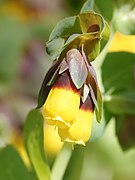Cerinthe major
Appearance
| Cerinthe major | |
|---|---|

| |
| In bloom | |

| |
| A particularly dark cultivar of Cerinthe major subsp. purpurascens | |
| Scientific classification | |
| Kingdom: | Plantae |
| Clade: | Tracheophytes |
| Clade: | Angiosperms |
| Clade: | Eudicots |
| Clade: | Asterids |
| Order: | Boraginales |
| Family: | Boraginaceae |
| Genus: | Cerinthe |
| Species: | C. major
|
| Binomial name | |
| Cerinthe major | |
| Synonyms[2] | |
|
List
| |
Cerinthe major, called honeywort along with other members of its genus, is an annual species of flowering plant in the genus Cerinthe, native to the Mediterranean region (southern Europe, western Asia and northern Africa), and introduced to New Zealand.[2] Gardeners have a choice along a spectrum of cultivars ranging from Cerinthe major subsp. major, with sea-green bracts and yellow flowers, to Cerinthe major subsp. purpurascens with blue bracts and purple flowers.[3]
Subspecies
[edit]The following subspecies are currently accepted:[2]
- Cerinthe major subsp. major
- Cerinthe major subsp. oranensis (Batt.) Selvi & L.Cecchi
- Cerinthe major subsp. purpurascens (Boiss.) Selvi & L.Cecchi
Flowering
[edit]In Europe, it flowers between May and August.[4]
References
[edit]- ^ Sp. Pl.: 136 (1753)
- ^ a b c "Cerinthe major L." Plants of the World Online. Board of Trustees of the Royal Botanic Gardens, Kew. 2017. Retrieved 13 December 2020.
- ^ Land, Leslie (January 2003). New York Times One Thousand Gardening Questions and Answers. p. 33. ISBN 9780761128861.
- ^ "Sarah Raven". Cerinthe major 'Purpurascens'. Retrieved 19 June 2021




